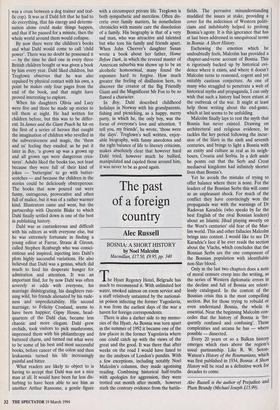The past of a foreign country
Alec Russell
BOSNIA: A SHORT HISTORY by Noel Malcolm Macmillan, f17.50, f9.95, pp. 340 The Hyatt Regency Hotel, Belgrade has much to recommend it. With unlimited hot water, smoked salmon on room service and a staff relatively untainted by the national- ist poison infecting the former Yugoslavia, it was from the earliest days of the war a haven for foreign correspondents.
There is also a darker side to my memo- ries of the Hyatt. As Bosnia was torn apart in the summer of 1992 it became one of the few places in the former Yugoslavia where one could catch up with the views of the great and the good. It was there that after weeks on the road I would have faxed to me the analyses of London's pundits. With a few exceptions, including notably Noel Malcolm's columns, they made agonising reading. Combining historical half-truths with apologies for aggression, they were trotted out month after month, however stark the contrary evidence from the battle- fields. The pervasive misunderstanding muddied the issues at stake, providing a cover for the indecision of Western politi- cians and indubitably helped to prolong Bosnia's agony. It is this ignorance that has at last been addressed in unequivocal terms in Bosnia: A Short History.
Eschewing the emotion which he undoubtedly feels, Malcolm has provided a chapter-and-verse account of Bosnia. This is rigorously backed up by historical evi- dence where it exists, and where it doesn't Malcolm turns to reasoned, cogent and yet suitably cautious conjecture. As one of many who struggled to penetrate a web of historical myths and propaganda, I can only wish that such a history had been extant at the outbreak of the war. It might at least help those writing about the end-game, which at last seems to be unfolding.
Malcolm finally lays to rest the myth that Bosnia has never existed. Drawing on architectural and religious evidence, he tackles the key period following the incur- sion of the Slays in the sixth and seventh centuries, and brings to light a Bosnia with an entity and culture as real as its neigh- bours, Croatia and Serbia. In a deft aside he points out that the Serb and Croat mediaeval kingdoms had infinitely shorter lives than Bosnia's.
Yet he avoids the mistake of trying to offer balance where there is none. For the leaders of the Bosnian Serbs this will come as an unpleasant shock. For much of the conflict they have convincingly won the propaganda war with the warnings of Dr Radovan Karadzic (who speaks by far the best English of the rival Bosnian leaders) about an Islamic Jihad playing sweetly on the West's centuries' old fear of the Mus- lim world. This and other fallacies Malcolm brings into context. I would like to see Dr Karadzic's face if he ever reads the section about the Vlachs, which concludes that the Bosnian Serbs are the one component of the Bosnian population with identifiable non-Slav blood.
Only in the last two chapters does a note of moral censure creep into the writing, as the series of Western diplomatic errors in the decline and fall of Bosnia are relent- lessly catalogued. In the context of the Bosnian crisis this is the most compelling section. But for those trying to rebuild or even understand Bosnia, the whole is essential. Near the beginning Malcolm con- cedes that the history of Bosnia is 'fre- quently confused and confusing'. These complexities and arcana he has — where possible — dissected.
Every 20 years or so a Balkan history emerges which rises above the region's usual partisanship. Like R. W. Seton- Watson's History of the Roumanians, which was first published in 1934, Bosnia: A Short History will be read as a definitive work for decades to come.
Alec Russell is the author of Prejudice and Plum Brandy (Michael Joseph f15.99).


























































 Previous page
Previous page